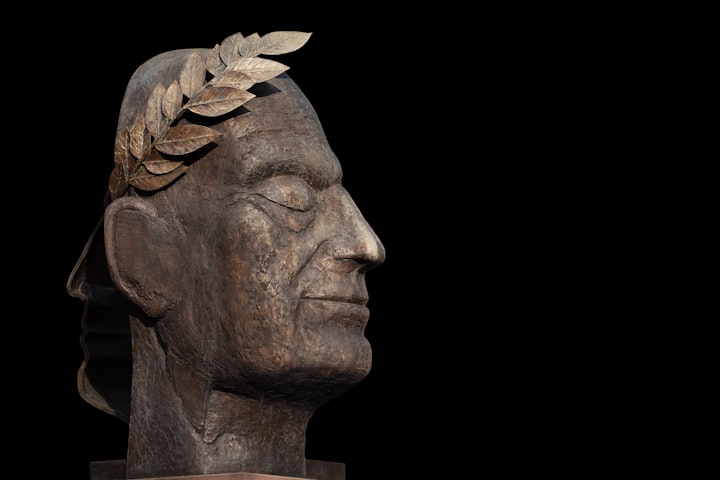
Throughout Shakespeare’s Julius Caesar, series of various circumstances are often misinterpreted for the worse and illustrate the blatant ineptitude of characters, resulting in the eventual downfall of many cast members across the board. Senator Cicero’s words on how “men may construe things after their fashion, clean from the purpose of the things themselves” speaks volumes on this matter, accurately describing how people often misconstrue and take great advantage of these opportunities with their benefit in mind and without the proper wherewithal to think beyond face value (1.3.33-36). The sheer inability of characters to grasp the bigger picture is what leads to their demise, highlighting how ill fit the ruling class is to properly officiate Rome. This especially holds true when analyzing the events involving Brutus being manipulated by the instance of Caesar falling in public’s eye as a sign for Rome beginning to crumble under his tyrannical rule, the forged letters to engage in the collective murder plot, and the obsequious cheering of plebeians.
Further expanding on the quote above, the portentous words of Cicero the night before the ides of March excellently envelope this idea of downfall associating with misinterpreting certain encounters. His elucidation of how man naturally constructs a narrative befitting of their personal beliefs reflects on how people opt to draw conclusions favoring their predispositions rather than taking the time to promptly analyze the situation at hand. The conspirators exhibit this behavior to a tee as, up until they murder Caesar, they pour so much effort to scrounge up as much reason to enact their cause in light of Caesar’s poor appearances. Every happenstance involving a misstep from Caesar is taken by the conspirators as an opportunity to strengthen their message. Cicero also speaking on how such instances of misconceptions stem from almost unrelated circumstances only adds to this notion. The ghostly visages and the screeching birds of ill omen cropping up were seen by Casca, a devoted conspirator, as the harm Caesar would bring as king when instead it can be seen as foreshadowing the true heinous intent behind the conspirators’ actions. Cicero is one of few characters privy to the natural order of his environment, but Brutus is the greatest to fall victim to this concept.
Caesar's literal fall begins as one of the first false flags to Brutus that killing Caesar is a necessary evil. Because this information came second-hand by way of Casca, his retelling of the fall is biased and constructed to appeal to Brutus’ beliefs in the conspirators’ will. Casca describes how Caesar “fell down in the marketplace, and foamed at mouth, and was speechless” in prose, detailing this ridiculously sounding sequence of events as though they are par for the course (1.2.252-253). Casca is attempting to normalize Caesar’s fallibility, manipulating Brutus into thinking this is to continue with Caesar actually receiving the crown. Casca’s mentioning of how he “durst not laugh, for fear of [...] receiving the bad air” from the crowd that caused Caesar to faint continues this persuasion of Caesar being foolishness personified (1.2.234-250). For Casca to emphasize the hilarity of the situation portrays Caesar as someone downright pathetic to uphold any position of power and potentially dangerous in one, intentionally signaling to Brutus the proposed peril to come. This literal fall from grace, while not even viewed by Brutus, is one of many instances to misconstrue him into enacting on the ideals he falls conflicted upon, and the events to follow only expedite these feelings.
The letters forged by Cassius act as the final straw to finally convince Brutus in collaborating with the conspirators in their unjustified mission, ingeniously playing towards Brutus’ nationalistic integrity. The clever inscription of “Brutus, thou sleep’st; awake, and see thyself” speaks directly to Brutus’ desire to maintain the noble infrastructure of Rome (2.1.46-48). To phrase this as Brutus being asleep, unconscious to the regressing world around him and relaxing amidst the suggested chaos brewing under Caesar’s reign is enough for him to look past the murder as a means of retaining a core value he holds dear for his nation. Brutus is encouraged to use his influence for the betterment of society, to awaken in light of the looming threat that Caesar brings upon Rome and to reflect on carrying out the most assertive course of action necessary. Brutus’ internal conflict prior to reading the letter surrounding Caesar being a serpent and debating needing to “kill him in the shell” now makes up a fixed image in his psyche (2.1.10-34). Brutus is now fully on board with the plot after taking in the letters, seeking to take out the serpent that is Caesar before anything escalates further. With Brutus completely persuaded, his mind stands rigid, disillusioned to the world around him until Caesar’s tyrannical rule comes to an end and he achieves the Rome he envisions.
The plebeians’ outcries initially in favor of Brutus’ display further lull Brutus into a false sense of security revolving around the sanctity of his actions. Their chants of “None, Brutus, none!” and “Live, Brutus! Live, live!” elevates Brutus’s confidence in his actions and ceases his inquisitive nature in debating the nobility of his cause (3.2.36, 3.2.48). In conjunction with the letters, Brutus is under the belief that he is fulfilling the desires of his Roman people, so these reactions of direct, unanimous consensus in response to Brutus at the forum puts his worries regarding the moral ambiguity of killing Caesar to rest. This however is superficial, for at no point does Brutus realize his motivation stems from servile commoners who simply oblige to his every word given his status and appeal to reasonable sensibilities; of course, these people would find no one who put Rome above all else and care for Brutus to live on and spread such an integral message. Chants like “Caesar's better parts Shall be crown'd in Brutus” and “Peace! Silence! Brutus speaks” may instill confidence in the way the people speak on retaining the redeemable aspects of Caesar found in Brutus as a leader and to provide their undivided attention to his presence respectively, but Brutus failing to acknowledge what lies beyond the situation is why he begins to reap what he has sowed (3.2.52, 3.2.55). This built-up confidence gets the better of Brutus by letting Antony, one of Caesar’s most loyal compatriots, take center stage with free range to speak his mind. The spectacular backfire that ensues from Antony quickly winning the hearts and minds of the public highlights the ineptitude and lacking worthiness of Brutus as a figurehead to be swayed by mere common folk.
As seen through Brutus’ miscalculations, Cicero’s words reign true on how the misconceptions of events are what lead to failure and reveal the legitimacy, or lack thereof, to take up a leadership role. Brutus failed on all accounts to comprehend the scale of his growing situation and act accordingly, his ill-conceived convictions on lacking “half so good a will'' to kill Caesar are only by the end self-acknowledged just before taking his own life out of regret (5.5.50-51). This play orchestrated not only the tragic demise of Julius Caesar but also the tragedy of Brutus and the devastation he wrought for his allies due to his poor decisions, illustrating how necessary having a proper resolve is in a position of great power.






Comments
There are no comments for this story
Be the first to respond and start the conversation.